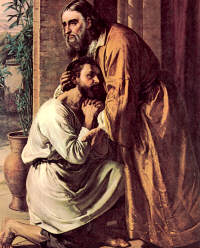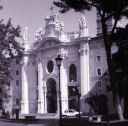We are ambassadors for Christ, as if God were appealing through us. (2 Corinthians 5:20)
During a high school trip around the world, William Borden, the heir of the Borden Dairy Company, felt a strong call to become a missionary for the Lord. He had seen so much poverty in his travels, and he wanted to dedicate himself to reaching out to all those who were suffering. When he made that decision, Borden wrote these words in his Bible: No reserve.
After graduating from college, Borden turned down a number of lucrative job offers. All he wanted was to be an overseas missionary. When he made that decision, Borden wrote these words in his Bible: No retreat.
Shortly after having completed his ministry training, Borden traveled to Egypt. There he was struck with a fatal case of spinal meningitis and died at the age of twenty-five. When he learned of his condition, Borden wrote these words in his Bible: No regrets.
In today’s second reading, St. Paul calls himself an ambassador for Christ. He lived his life as a representative of the Lord. As such, he felt personally responsible to further the mission of the Church wherever he went and whatever he did.
William Borden was convinced to serve the Lord during a round-the-world vacation. Paul felt the call while he was persecuting the Church. Like them—and like every saint in the Church—we too are called to be ambassadors for Christ. God wants us to become his representatives as we go about our daily lives.
So Mister or Madame Ambassador, always be open and alert for your next assignment. It may come during a routine day, or it may come in the midst of a momentous event. No matter how it comes, embrace it with all your heart. Follow your assignment, and dedicate yourself to living for the glory of Jesus. Make this your motto: “No reserve, no retreat, no regret.”
“Here I am, Lord. Send me!”
Joshua 5:9-12; Psalm 34:2-7; Luke 15:1-3, 11-32
Questions for Reflection or Group Discussion
1. In the first reading, we see the Lord ceasing to provide manna, when the Israelites were able to produce their own grain. What do you believe is the message of this passage? How does it apply to way the Lord acts in your own life?
2. The responsorial psalm invites us to “taste and see the goodness of the Lord”. What additional steps might you take—through your prayer and reception of the Eucharist—to deepen your relationship with the Lord and “be radiant with joy”?
3. In the second reading, St. Paul speaks of the change that comes over us through our relationship with Christ—in fact more than just a change, we become a wholly “new creation.” Do you believe this? Why or why not? In what ways does your life reflect the reality that you are a new creation in Christ? In what ways does it not? What can you do to make it a greater reality in your life?
4. St. Paul also tells us we are ambassadors of reconciliation. What practical steps can you take to bring reconciliation within your family or within your parish? Is there anyone that you need to be reconciled to, e.g., someone with whom you may have quarreled or harbor resentments or unforgiveness? What steps can you take to be reconciled to them (minimally, you can pray for them)?
5. In the familiar Gospel story of the prodigal son, the younger brother demands what his fathers “owes” him and then leaves? What are the circumstances in your life that can cause you to value what God can do for you more than you value a relationship of love and intimacy with him? What caused you to come to your senses?
6. In what areas of your life do you see attitudes like the older brother (e.g., lack of gratitude, lack of compassion, unforgiveness, self-righteousness)? What steps can you take to change these attitudes?
7. The meditation ends with these words: “Dedicate yourself to living for the glory of Jesus. Make this your motto: ’No reserve, no retreat, no regret.’” What do the three words of this motto mean to you? Are their some additional steps you can take during this grace-filled season of Lent that will make these words come alive—especially, as you try to live out each day “for the glory of Jesus”?
8. Take some time now to pray and ask Jesus for the grace to say yes to the call to be “ambassadors for Christ”—and to do so with “no reserve, no retreat, and no regret.” Use the prayer at the end of the meditation as a starting point.

